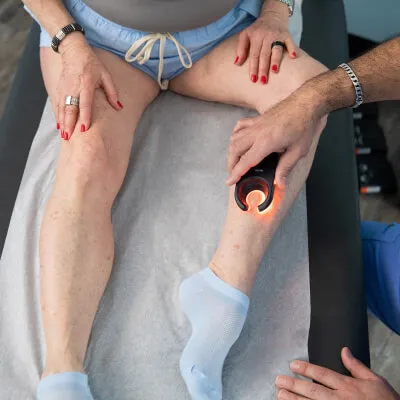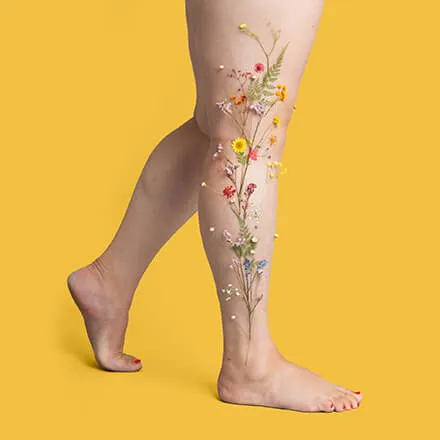Did you know that certain behaviors we do every day, like prolonged sitting or standing, can lead to vein problems? Fortunately, these risk factors are easy to identify and relatively simple to adjust.
Learn more about risky behaviors for vein problems, how they impact vein health, and how to counteract them with healthier alternatives.

Understanding Risky Behaviors for Vein Problems
Veins are vessels that transport blood from tissues, organs, and muscles to the heart. For this process to run smoothly, your muscles must contract hard enough to activate the venous valves. These valves flap open to permit the passage of oxygen-poor blood and close to prevent it from flowing backward.
Unfortunately, certain lifestyle habits can damage the valves, preventing proper blood flow and circulation. These risk factors are divided into two groups: modifiable (things you can change) and non-modifiable (things you can't change).
Modifiable Factors:
- Sedentary lifestyle
- Lack of exercise
- Tobacco use
- Occupation
- Poor diet
- Excessive alcohol use
- Obesity
Non-Modifiable Factors:
- Genetic abnormalities
- Aging/being at an advanced age
- Family history
- Pregnancy
- Gender

Sedentary Lifestyle and Its Impact on Vein Health
An inactive lifestyle can lead to poor blood circulation and increased pressure on the veins. Over time, this may result in the development of serious health complications, including:
- Deep vein thrombosis
- High blood pressure
- High cholesterol
- Heart attack risk
- Diabetes
- Cancer
- Stroke
Many health conditions can develop without noticeable symptoms, so you might not be aware of them until they have progressed significantly. To prevent these issues, it's crucial to include physical activity in your daily routine and to wear compression stockings during periods of inactivity. Light to moderate exercise can also help counteract the risks associated with a sedentary lifestyle and promote healthy veins.
How Weight Management Influences Vein Health
Unfortunately, until the excess weight is shed, the damage continues to worsen, leading to debilitating complications, including venous ulcers and chronic venous insufficiency.
Maintaining a healthy weight is essential to lowering these risks. Here are some simple strategies you can start using today after consulting with your primary care provider:
- Eat a whole food-based diet.
- Walk at least 30 minutes per day.
- Eat low-fat, low-sodium foods.
- Try intermittent fasting a few days per week.
- Cut out processed foods that are not nutrient-dense
- Engage in indoor cycling to relieve pressure on your leg veins.
- Eat within your recommended calorie count.
- Drink plenty of water every day to prevent dehydration.
Negative Impacts of Smoking and Alcohol on Veins
Nicotine, a compound found in tobacco products, is not only addictive but also harmful to your vessels, resulting in an increased risk for deep vein thrombosis in the veins and peripheral artery disease (PAD) in the arteries.
Alcohol is another substance that can cause vein problems. Excess consumption can increase the heart rate, forcing more blood through the veins and stressing the valves.
To minimize these risks, it's best to drink in moderation, if at all, and to quit smoking altogether.
Dietary Choices and Their Impact on Vein Health
Nutrition plays a significant role in how your veins function. High-sodium foods like potato chips and processed meat cause the body to retain fluid. This excess fluid adds pressure to the veins, increasing the risk of varicose veins. Low-sodium options are better for vein health and can reduce your risk of developing high blood pressure.
Another consideration is to stay hydrated. Dehydrated blood is thick and harder to move through the veins. Unfortunately, this makes the veins work harder and can cause the valves to malfunction over time.
Fashion Choices and Healthy Veins
Choosing loose and comfortable clothing over tight and form-fitting is best for vein health. Tight clothing can restrict blood flow. Over time, this can lead to poor circulation, contributing to leg swelling and varicose veins.
The same rule applies to tight shoes, especially high heels. The more they restrict the movement of your foot and calf, the more pressure they add to your leg veins.

Low-Impact vs. High-Impact Exercise: What's Best for Vein Health?
Did you know that a sedentary lifestyle is one of the top causes of vein disease? This is why regular exercise is so important. Not only does it improve blood flow, but it also drastically reduces your risk of developing vein disease and deep vein thrombosis. However, when you choose an exercise, it's best to go for low-impact activities. Heavy weights can worsen damaged veins due to increased pressure and straining.
Hormonal Fluctuations and Vein Disease
Fluctuations in hormones significantly impact vein health -- especially women who use hormonal contraceptives and pregnant women. During pregnancy, your veins are dealing with increased blood flow and pressure from a growing abdomen. High levels of estrogen have been associated with the clinical findings of varicose veins due to its ability to cause dilation, increasing venous pressure and distention. In addition, decreased progesterone may also play a role in the development of varicose veins in postmenopausal women.
Environmental Factors and Vein Health
Excessive heat can cause your veins to dilate and expand. While this isn't a problem in most people, those with vein disease may experience worsening symptoms; especially people with varicose veins.
Direct sun exposure can also be detrimental to legs that were just treated for varicose veins. The best way to minimize this risk is to protect your legs from direct sunlight and use sunblock to keep treated veins from darkening.
Conclusion
Protecting your vein health starts with understanding the everyday habits and factors that may be putting you at risk. Small, mindful changes to your lifestyle, like staying active, maintaining a healthy weight, and avoiding harmful substances, can make a big difference in preventing vein problems. By addressing these modifiable risk factors, you can support better circulation and long-term health.
Schedule a free vein health assessment at Metro Vein Centers to identify your personal risk factors and discuss your treatment options.
Frequently Asked Questions
Can certain types of exercise worsen varicose veins?
Exercise helps prevent varicose veins, but powerlifting and heavy weights may worsen symptoms due to increased pressure on leg veins.
What's the connection between constipation and vein problems?
Constipation can lead to straining and prolonged time on the toilet, increasing pressure in the abdomen and potentially weakening leg veins, especially for those with frequent constipation.
How can lifestyle changes improve vein health?
Lifestyle changes can help improve vein health by improving circulation and reducing inflammation, which help to prevent blood clots.
Are there specific professions that put people at higher risk for vein issues?
Any profession that requires long periods of sitting or standing can place people at a higher risk of developing vein issues.

Dr. Philip LoPresti
Meet Dr. Philip LoPresti DO, DABVLM, FACS, a board-certified vein specialist and surgeon with over 20 years of experience. Schedule an appointment with him in Queens, NY today.
Meet Dr. Philip LoPresti
Trusted insight from the nationally accredited, board-certified vein doctors at Metro Vein Centers.






